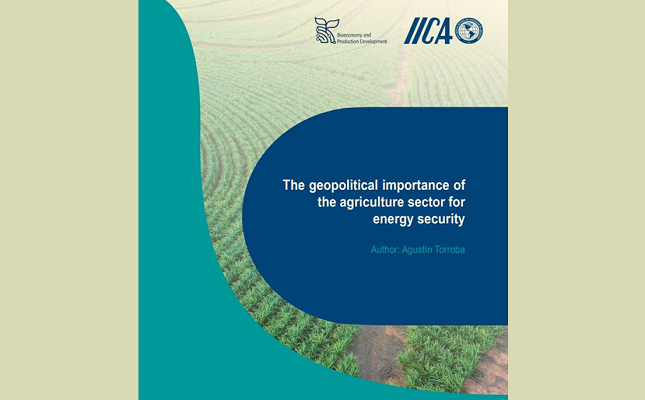|
|
|
The agricultural sector in the Americas can make a key contribution to global energy security, under threat due to the conflict in Eastern Europe

|
|
|
|
|
|
|
|
| By: (IICA), Press Release |
|
|
|
|
San Jose, 22 April 2022 (IICA) - The agricultural sector in the Americas has a vital role to play in bolstering global energy security following the outbreak of the armed conflict in Eastern Europe, in addition to its traditional role as a key producer of food for the world.
This is one of the points made in the document, “The geopolitical importance of the agriculture sector for energy security,” published recently by the Inter-American Institute for Cooperation on Agriculture (IICA).
The report noted that the Americas produce 71% of the world’s liquid biofuels. Biofuels have taken on strategic importance as a substitute for oil and natural gas in the current international scenario, with the armed conflict having placed energy supplies and energy security at risk.
The conflict in Eastern Europe is having a negative economic impact not only in the Old Continent, but across the globe. In the last month, the price of liquefied natural gas (LNG) has risen by more than 600%, while shortages are expected to worsen the situation, since Russia is Europe’s biggest supplier of natural gas.
Russia is also one of the world’s most important oil producers (it is estimated that it accounts for 12% of total crude oil supplies), so the sanctions imposed by the international community prohibiting fuel imports from that country are bound to have serious consequences.
“In light of this situation, the agricultural sector in the Americas can play a key role, as it is an agro-exporter par excellence, contributing to global food security and even to energy security. These two objectives are not at odds, since diversification in the efficient, integrated use of biomass to produce biofuels can enhance the efficiency and safety of agri-food systems”, the report observes. The author of the document is IICA Biofuels and Bioenergy Specialist Agustín Torroba.
Biofuels already contribute more than 150 million cubic meters to the global liquid fuel matrix, with biodiesel accounting for 33% of the total and bioethanol for 67% (with the latter either being mixed with, or used in place of, gasoline). The Americas account for 88% of global bioethanol production, and 36% of biodiesel production.
The principal raw materials used to make bioethanol are corn and sugarcane, while biodiesel is produced from soybean and palm oils. The Americas have large exportable balances of these raw materials, which could double world bioethanol production and increase biodiesel production by 80%, the document reveals.
“Today, the liquid biofuels produced in the Americas cover 22% of the continent’s deficit of crude oil and its by-products. If processed, the exportable balances of raw materials could cover 53% of the total. High oil prices, added to the tax differential, especially in countries that have imposed a carbon dioxide tax, place biofuels ¾and especially bioethanol¾ in an economically advantageous position,” says the IICA study.
Thus, the continent has enormous potential to expand biofuel production and help achieve the goal of energy security.
The document points out that the biofuel industry has reached a level of maturity and competitiveness that has enabled it to significantly lower its production costs in the last decade and to be increasingly competitive compared to fossil fuels.
The report adds that environmental commitments are a plus for sustainable biofuel production and consumption. This is reflected in the fact that more than 60 countries have mandated the use of biodiesel, bioethanol, or both. High taxes also tend to make fossil-based products more expensive, especially given the increasingly widespread use of carbon dioxide taxes, and this helps create a window of opportunity that facilitates energy transition and even greater development of biofuels.
IICA assists the countries of the Americas in disseminating and communicating information about the importance of the sustainable use of biofuels, and in building institutional frameworks and public policies that promote the transition to clean energy in the transport sector.
Disclaimer
This article was posted in its entirety as received by SKNVibes.com. This media house does not correct any spelling or grammatical error within press releases and commentaries. The views expressed therein are not necessarily those of SKNVibes.com, its sponsors or advertisers
|
|
|
|
|
|
|
|